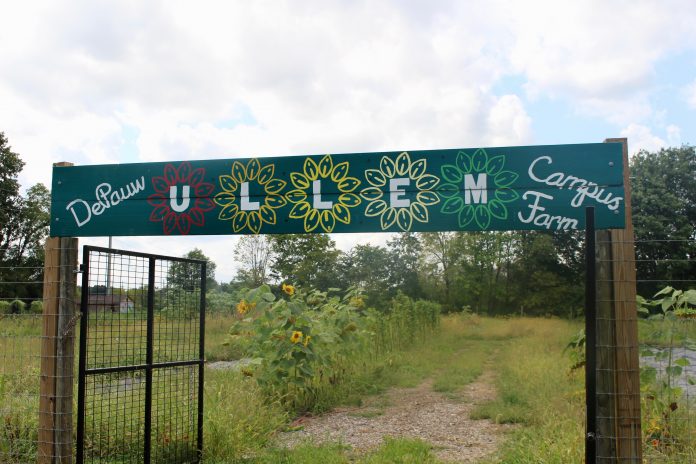
The Gap Between Greek and Green
DePauw University has been a consistent advocate for sustainability, yet there seems to be a gap between sustainability efforts on campus and within Greek chapters.
“The problem is, super enthusiastic seniors will graduate and then there is nobody to pick up the mantle and carry it on,” Jeanette Pope, professor of geoscience and faculty sustainability coordinator, said.
Pope has been involved with DePauw sustainability since the office first opened and has focused her research around sustainability for the last seven years. She teaches a first year seminar, “campus sustainability,” and also works as a resource member to make sure the University’s strategic plan aligns with environmentally friendly efforts. She believes the biggest challenge in Greek living units is making sure the entire house is on board with the same goals. Pope knows in the past, some sororities have worked with her to ensure recycling is accessible, yet is uncertain if these same efforts remain.
Greek Chapter’s Efforts
Most sororities on DePauw’s campus said they do have recycling bins, but only one chapter has a working sustainability director.
Sophomore Arianna Poland is the director of sustainability at Delta Gamma (DG) and also serves as the project manager for the Zero Waste Group in DePauw’s sustainability leadership program.
Poland explained she uses her position to make sustainability both a conscious effort and a fun way to bond at DG. Poland does so by creating incentives like painting bottle cans to begin sustainability conversations. She also recycles their Keurig coffee cup grounds at the campus farm and collects and recycles old contact lenses, which goes hand in hand with DG’s philanthropy, “Service for Site.'' This year, she wants to work on getting a compost bin outside of the house to help enforce zero waste.
Poland believes Greek Life still has a far way to go but thinks creating a director of sustainability in each chapter is a great way to start.
“There’s only so much that the sustainability program can do, but if they have eyes and ears within Greek Life then more can be done to make DePauw an overall better place,” Poland said.
As far as fraternities are concerned, they do have recycling bins outside, but no houses have a director of sustainability.
Plans
Claire Dorner, director of sustainability and assistant farm manager, gave insight to what sustainability could look like within sorority and fraternity houses. She wants to work on creating a director of sustainability in every chapter. Her hope is for these directors to work together and alongside the office of sustainability so that everyone is on board with the mission of the University. One area the director of sustainability could implement within their chapters in making an event “green.”
She explained, “A ‘green’ event means it has a lower impact on the environment in a bunch of different categories. This could mean prioritizing local food vendors, having vegetarian options, and even creating a detailed RSVP list to limit food waste.”
Dorner and her colleagues are still toying around with what funding might be available from the student government to have an event “green certified,” and also the incentives to eventually become labeled as a “green organization.”
Junior Maggie Keller, project manager for DePauw’s second hand clothing shop, Thrifty Tiger, also has some ideas about how to engage Greek Life.
“I’m thinking about holding a competition. Each house could have a clothes donation bin and battle monthly to turn in the most amount of clothes,” Keller said.
This is Keller’s first year as project manager and as a member of a Greek chapter herself, she is passionate about getting members excited about sustainability. Thrifty Tiger is anticipating a re-opening soon and will be located in the basement of Mason Hall. Keller also wants to host a fashion show and have an upcycling workshop where she teaches Greek members how to sow and rehab old clothes.
Another member of DePauw’s sustainability program, junior Sophia Jones, agrees that increasing engagement in Greek houses is important. Jones began working as the beekeeper intern this past summer, and now takes care of the two hives on campus. The honey made is sent to Hoover Hall and also sold in Myers’ Market.
“I don’t think people realize the importance of our pollinators. We could lose as much as 90% of our world's crops if we lost honey,” Jones said.
She would like to get an observation hive so students can see what it looks like inside of the hives. Jones believes this would help students understand the importance of protecting bees. Her favorite part about working with DePauw’s sustainability program is being able to see the direct impact it has in the Greencastle community.
Greek life accounts for about 62% of students at DePauw University, and without their efforts in sustainability there is a gap in going green on campus. It is easier than Greek members may think to reduce carbon footprints and combat climate change. Here are 10 easy ways to get involved in going green on campus:
Easy Ways to Go Green
- Attend meetings in the basement of the Memorial Student Union Building (UB) Tuesdays at 4 p.m.
- Recycle old batteries outside of the mailroom in the UB
- Volunteer at the Campus Farm on Fridays
- Shop at the Thrifty Tiger Email @margaretkeller_2023@depauw.edu for more information
- Come to the Stewart Plaza on Fridays 11:30-12:30 p.m. for free farm produce
- Attend the Harvest Festival at the Campus Farm October 30 at 4 p.m.
- Ask the office of sustainability for a bike rental
- Reach out to get your own compost bin
- Become a Green Tiger and receive weekly emails from the office of sustainability
For additional information about how to get involved with DePauw’s sustainability programs, contact @clairedorner@depauw.edu or @sustainability@depauw.edu and check out
www.depauw.edu/offices/sustainability.
